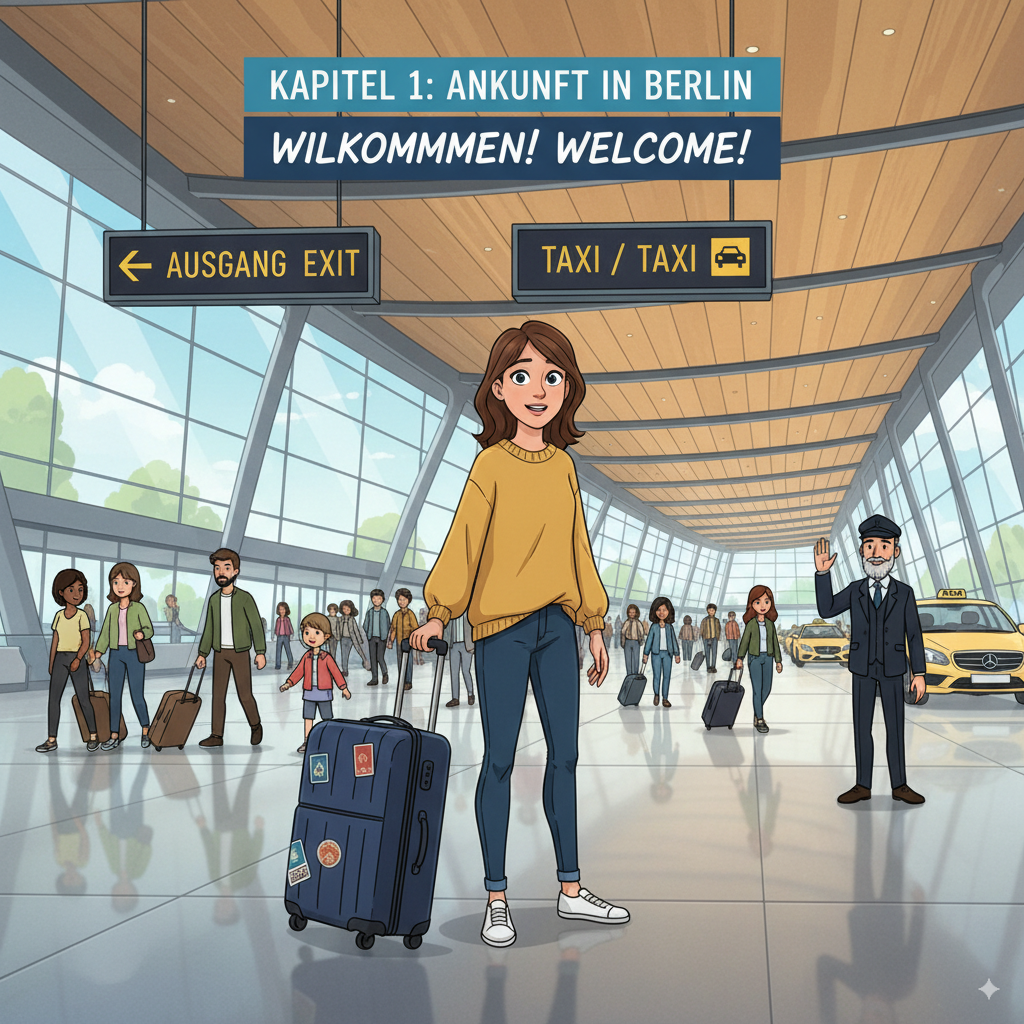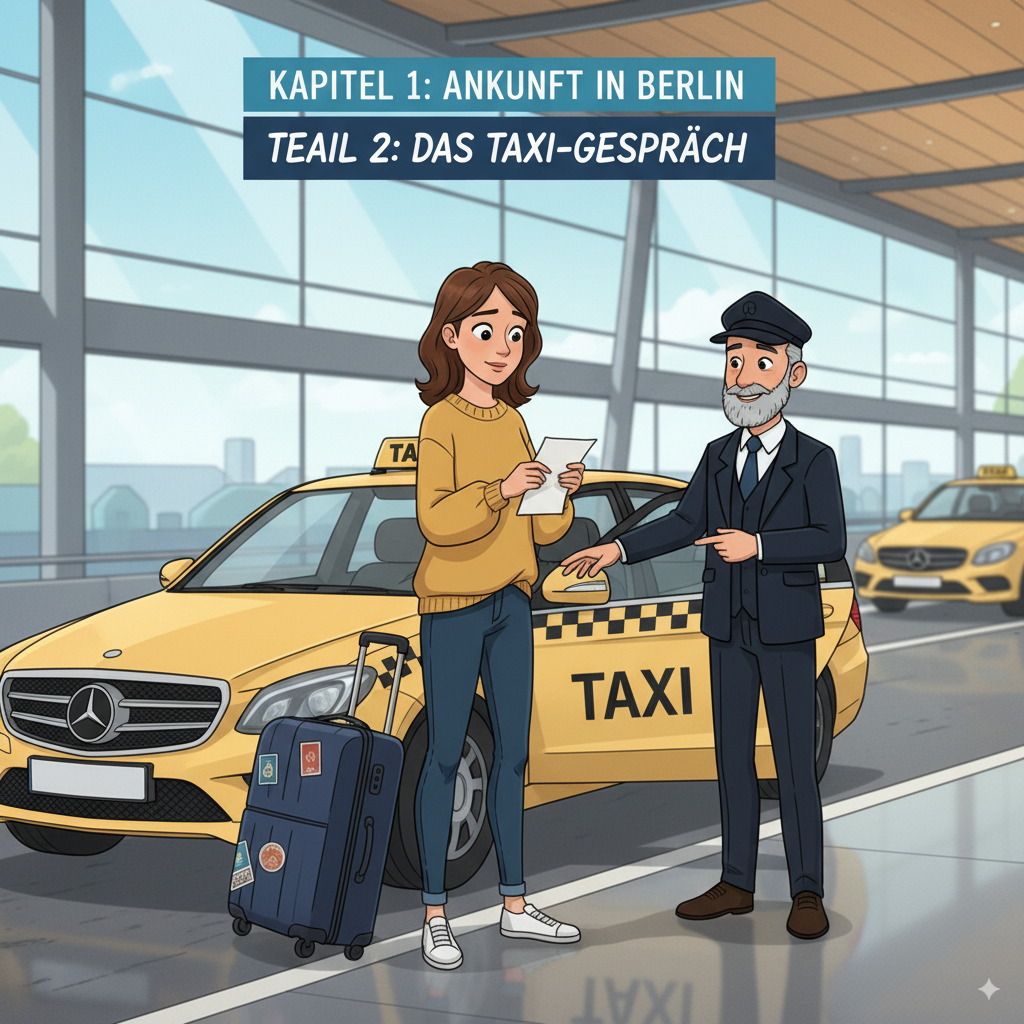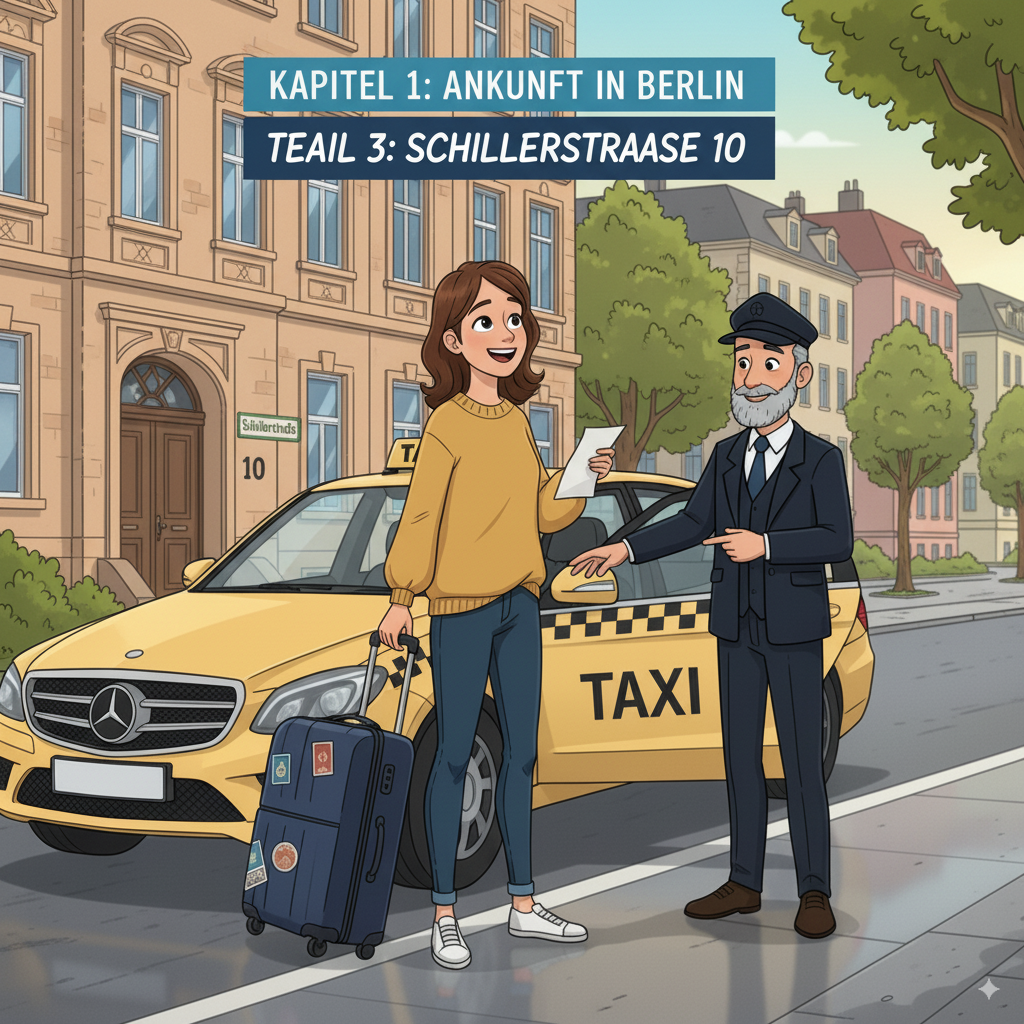Kapitel 1: Ankunft in Berlin (Arrival in Berlin)
Willkommen! Welcome!
Hallo! Welcome to the first chapter of your German learning journey. We will follow Anna as she arrives in Germany and starts learning the language, just like you! Don't worry, we will start slowly. Read the story, learn the new words, understand the basic grammar, and do the exercises. Viel Erfolg! (Good luck!)
Die Geschichte (The Story) - Teil 1
Anna ist in Deutschland! Genauer gesagt: Anna ist in Berlin. Sie steht im Flughafen. Der Flughafen heißt BER – Flughafen Berlin Brandenburg. "Wow, Berlin!", denkt Anna. Sie schaut sich um. Der Flughafen ist groß. Sehr groß! Viele Menschen sind hier. Männer, Frauen, Kinder. Sie sprechen Deutsch. Anna versteht nicht. Noch nicht.
Anna ist ein bisschen müde. Die Reise war lang. Sie hat einen Koffer. Der Koffer ist schwer (heavy). Anna sucht Informationen. Wo ist der Ausgang (exit)? Wo sind die Taxis? Sie sieht ein Schild (sign). Auf dem Schild steht: Ausgang / Exit. Gut! Sie sieht noch ein Schild. Auf dem Schild steht: Taxi. Sehr gut!
Anna geht zum Taxistand (taxi rank). Da sind viele Taxis. Gelbe Taxis. Ein Mann steht neben einem Taxi. Er trägt eine Mütze (cap). Er sieht freundlich (friendly) aus.
Neue Wörter (New Words) - Teil 1
Let's look at some important words from the story.
- Deutschland: Germany
- Berlin: Berlin (the capital city of Germany)
-
der Flughafen: the airport (Hint: words ending in
-hafenare often masculine,der) - groß: big, large
- sehr: very
- die Menschen (Plural): people (Singular: der Mensch - the person)
- hier: here
- sprechen: to speak
- Deutsch: German (the language)
- verstehen: to understand
- nicht: not
- müde: tired
-
der Koffer: the suitcase (Hint: words ending in
-errepresenting objects are oftender) - suchen: to look for, to search
- das Schild: the sign
-
der Ausgang: the exit (Hint: words ending in
-gangare oftender) - das Taxi: the taxi
- gut: good
- gehen: to go, to walk
- der Taxistand: the taxi rank
Grammatik (Grammar) - Teil 1: Das Verb "sein" (The Verb "to be")
The verb "sein" is one of the most important verbs in German, just like "to be" in English. It changes depending on who is doing the action (the subject). For now, let's learn two forms:
| Pronoun (English) | Pronoun (German) | Verb Form "sein" | Example German | Example English |
|---|---|---|---|---|
| I | ich | bin | Ich bin Anna. | I am Anna. |
| You (formal) | Sie | sind | Sie sind in Berlin. | You are in Berlin. |
| he/she/it | er/sie/es | ist | Er ist müde. | He is tired. |
| Das Taxi ist gelb. | The taxi is yellow. |
- Important: In German, you use "Sie" (always capitalized) when talking politely or formally to adults you don't know. We use "du" for friends, family, and children (we will learn this later). Anna will use "Sie" with the taxi driver.
- Notice that "sie" (lowercase) means "she", while "Sie" (uppercase) means formal "you". Context helps!
- "er" means "he", "es" often refers to objects or concepts that have the grammatical gender "das" (like
das Taxi).
Übung (Exercise) 1: sein (bin / ist / sind)
Fill in the blanks with the correct form of "sein" (bin, ist, or sind).
- Ich ______ müde. (I am tired.)
- Der Flughafen ______ groß. (The airport is big.)
- Anna ______ in Berlin. (Anna is in Berlin.)
- Sie [talking formally to one person] ______ der Taxifahrer? (Are you the taxi driver?) - Hint: Questions often start with the verb!
- Ich ______ Anna Schmidt. (I am Anna Schmidt.)
- Das Taxi ______ hier. (The taxi is here.)
(Answers at the end of the chapter)
Die Geschichte (The Story) - Teil 2
Der Mann am Taxistand sieht Anna. Er lächelt (smiles). "Guten Tag!", sagt der Mann. Seine Stimme ist freundlich. Anna ist ein bisschen nervös. Ihr erstes Gespräch (conversation) auf Deutsch! "Guten Tag!", antwortet Anna. Sie versucht (tries), klar (clearly) zu sprechen.
Der Mann fragt: "Ein Taxi?" Anna nickt (nods). "Ja, bitte." "Okay. Wohin?" fragt der Mann. (Wohin? = Where to?) Oh. Das ist eine Frage (question). Anna hat eine Adresse (address) auf einem Zettel (piece of paper). Sie zeigt dem Mann den Zettel. Der Mann liest (reads) die Adresse. "Ah, okay. Schillerstraße. Kommen Sie!" Anna ist erleichtert (relieved). Er versteht! "Danke!", sagt Anna. "Bitte!", sagt der Mann. Er öffnet (opens) die Tür vom Taxi. Anna steigt ein (gets in).
Neue Wörter (New Words) - Teil 2
- Guten Tag!: Hello! / Good day! (Formal greeting, used during the day)
- Hallo!: Hello! (More informal, but also very common)
- sagen: to say
- antworten: to answer
- Ja: Yes
- Nein: No
- Bitte: Please / You're welcome (Very useful word!)
- Danke: Thank you
- die Adresse: the address
- der Zettel: the piece of paper
- lesen: to read
- verstehen: to understand (We saw this before - repetition helps!)
- Okay: Okay (Same as in English!)
- Kommen Sie!: Come! (Formal command/invitation)
Kulturtipp (Cultural Tip) 1: Greetings and Politeness
- In Germany, saying "Guten Tag" is a standard, polite way to greet someone you don't know during the daytime (roughly 10 am to 6 pm). In the morning, you might hear "Guten Morgen" (Good morning), and in the evening, "Guten Abend" (Good evening).
- Using "Bitte" (Please) and "Danke" (Thank you) is very important and shows respect. You can also reply with "Bitte" when someone says "Danke" (meaning "You're welcome").
- Addressing strangers or people in authority with "Sie" (formal you) is the norm. Using "du" (informal you) without being invited can be considered impolite in many situations.
Übung (Exercise) 2: Dialog (Dialogue)
Complete the short dialogue. Choose words from the box.
Box: Danke, Guten Tag, Ja, Bitte, Taxi
- Taxifahrer: ____________!
- Anna: Guten Tag!
- Taxifahrer: Ein ____________?
- Anna: ____________, bitte.
- Taxifahrer: Okay. Kommen Sie!
- Anna: ____________!
- Taxifahrer: ____________!
(Answers at the end of the chapter)
Grammatik (Grammar) - Teil 2: Das Verb "heißen" (To be called)
Another useful verb for introductions is "heißen". It means "to be called" or "my name is / your name is".
| Pronoun (English) | Pronoun (German) | Verb Form "heißen" | Example German | Example English |
|---|---|---|---|---|
| I | ich | heiße | Ich heiße Anna. | I am called Anna. |
| You (formal) | Sie | heißen | Sie heißen Herr Müller. | You are called Mr. Müller. |
Grammatik (Grammar) - Teil 3: Fragen stellen (Asking Questions)
We saw two basic ways to ask questions:
-
Ja/Nein Fragen (Yes/No Questions): The verb comes first.
- Statement: Sie sind Herr Müller. (You are Mr. Müller.)
- Question: Sind Sie Herr Müller? (Are you Mr. Müller?)
- Possible Answers: Ja. / Nein.
-
W-Fragen (W-Questions): These use question words (many start with 'W' in German). The question word comes first, then the verb, then the subject (often).
-
Wer? (Who?)
- Example: Wer sind Sie? (Who are you? - formal)
- Answer: Ich bin Anna. / Ich heiße Anna.
-
Wie? (How?)
- Example: Wie heißen Sie? (What are you called? / What is your name? - formal)
- Answer: Ich heiße Anna Schmidt.
- (We also saw Wohin? (Where to?), but we will focus on Wer? and Wie? for now.)
-
Wer? (Who?)
Übung (Exercise) 3: heißen (heiße / heißen) und Fragen (Questions)
A. Fill in the blanks with heiße or heißen.
- Ich ______ Peter.
- Wie ______ Sie?
- Sie ______ Frau Weber.
B. Match the questions (1-3) to the answers (a-c).
- Wer sind Sie?
- Sind Sie Herr Schmidt?
- Wie heißen Sie?
a. Ich heiße Maria Rossi. b. Ich bin Paul Müller. c. Ja, ich bin Herr Schmidt.
(Answers at the end of the chapter)
Die Geschichte (The Story) - Teil 3
Das Taxi fährt (drives). Anna schaut aus dem Fenster (window). Sie sieht Häuser (houses), Straßen (streets), und Bäume (trees). Alles ist neu (new) und interessant (interesting). "Berlin ist schön (beautiful)," denkt Anna. Nach einiger Zeit (After some time), das Taxi hält an (stops). "Wir sind da," sagt der Taxifahrer. "Schillerstraße Nummer 10." Anna schaut auf ihren Zettel. Ja, das ist die Adresse. Sie muss bezahlen (pay). "Was kostet das?", fragt Anna. (How much does it cost?) Der Taxifahrer sagt einen Preis (price). Anna gibt (gives) ihm das Geld (money). "Danke schön," sagt der Taxifahrer. ("Schön" makes "Danke" stronger - Thank you very much). "Bitte schön. Auf Wiedersehen!", antwortet Anna. Sie hat "Auf Wiedersehen" gelernt (learned). Es bedeutet "Goodbye" (formal). "Auf Wiedersehen!", sagt der Mann.
Anna steigt aus dem Taxi. Sie nimmt ihren Koffer. Sie steht vor einem großen Haus. Schillerstraße 10. Hier ist ihr neues Zuhause (home). Das Abenteuer (adventure) beginnt!
Neue Wörter (New Words) - Teil 3
- fahren: to drive, to travel
- das Fenster: the window
- das Haus: the house
- die Straße: the street
- der Baum: the tree
- neu: new
- interessant: interesting
- schön: beautiful, nice
- bezahlen: to pay
- kosten: to cost (often used in the question: Was kostet...?)
- das Geld: the money
- Danke schön: Thank you very much
- Bitte schön: You're very welcome / Here you go
- Auf Wiedersehen: Goodbye (formal)
- Tschüss: Bye (informal - we will use this later!)
- das Zuhause: home
Übung (Exercise) 4: Wörter finden (Find the words)
Find the German words in the text for the following English words:
- Goodbye (formal): _______________
- to pay: _______________
- the money: _______________
- the house: _______________
- beautiful: _______________
- new: _______________
(Answers at the end of the chapter)
Optional: Das deutsche Alphabet (The German Alphabet)
Knowing the alphabet helps with spelling names and understanding. Most letters are similar to English, but pronunciation can differ. Listen to your teacher or audio resources!
A (ah), B (beh), C (tseh), D (deh), E (eh), F (eff), G (geh), H (hah), I (ee), J (yot), K (kah), L (ell), M (emm), N (enn), O (oh), P (peh), Q (koo), R (err - often rolled or guttural), S (ess), T (teh), U (oo), V (fow - like 'f'), W (veh - like 'v'), X (ix), Y (üpsilon), Z (tset - like 'ts')
Special sounds:
- Ä / ä (ae - like 'a' in 'cat' or 'e' in 'bet')
- Ö / ö (oe - like 'i' in 'bird', rounded lips)
- Ü / ü (ue - like 'ee', rounded lips)
- ß (eszett or scharfes S - looks like 'B', sounds like 'ss') - Used after long vowels or diphthongs. Example: heißen.
Übung (Exercise) 5: Buchstabieren (Spelling)
Imagine someone asks you "Wie schreibt man das?" (How do you write that?). Try spelling these words (say the letter names in German):
- ANNA: ____ - ____ - ____ - ____
- TAXI: ____ - ____ - ____ - ____
- BERLIN: ____ - ____ - ____ - ____ - ____ - ____
- DANKE: ____ - ____ - ____ - ____ - ____
(Practice speaking these!)
Zusammenfassung (Summary) - Chapter 1
In this chapter, you learned:
- Anna arrived in Berlin at the airport (Flughafen).
- She took a taxi (das Taxi) to her address (die Adresse).
- Basic greetings: Guten Tag! Hallo!
- Polite words: Bitte, Danke, Danke schön, Bitte schön.
- Saying yes and no: Ja, Nein.
- Saying goodbye: Auf Wiedersehen!
- How to introduce yourself: Ich bin... / Ich heiße...
- How to ask who someone is: Wer sind Sie?
- How to ask someone's name: Wie heißen Sie?
- The verb sein (to be) in forms: ich bin, Sie sind, er/sie/es ist.
- The verb heißen (to be called) in forms: ich heiße, Sie heißen.
- Some basic nouns related to arrival and location.
Super! You have completed the first chapter. Read it again, listen to the pronunciation if possible, and make sure you understand the basics. Im nächsten Kapitel (In the next chapter), Anna explores her new apartment! Bis bald! (See you soon!)
Antworten zu den Übungen (Answers to the Exercises)
- Übung 1: 1. bin, 2. ist, 3. ist, 4. Sind, 5. bin / heiße, 6. ist
- Übung 2: 1. Guten Tag, 3. Taxi, 4. Ja, 6. Danke, 7. Bitte
-
Übung 3:
- A: 1. heiße, 2. heißen, 3. heißen
- B: 1-b, 2-c, 3-a
- Übung 4: 1. Auf Wiedersehen, 2. bezahlen, 3. das Geld, 4. das Haus, 5. schön, 6. neu
-
Übung 5: (German letter names)
-
- A - N - N - A (ah - enn - enn - ah)
-
- T - A - X - I (teh - ah - ix - ee)
-
- B - E - R - L - I - N (beh - eh - err - ell - ee - enn)
-
- D - A - N - K - E (deh - ah - enn - kah - eh)
-




No Comments